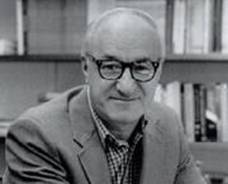罗伯特·班杜拉(Albert Bandura)
——教育家、社会心理学家(1925 ~ ) |
|
罗伯特·班杜拉(Albert Bandura,1925—)出生在加拿大艾伯特省的蒙达。1949年,他在加拿大不列颠哥伦比亚大学获学士学位,1951年在美国衣阿华大学获心理学硕士学位,翌年获哲学博士学位。他在衣阿华攻读期间,尽管接受的是临床心理学方面教育,但由于受道贺尔的学生斯彭斯的影响,对实验模式的有效性印象颇深。 |
1953年,他到维基台的堪萨斯指导中心,担任博士后临床实习医生,同年应聘在斯丹福大学心理学系执教,1964年升任正教授。在这期间,受赫尔派学习理论家米勒(N.Miller)、多拉德(J.Dollard)和西尔斯(R.R.Sears)的影响,把学习理论运用于社会行为的研究中。此后,除了1969年任行为科学高级研究中心研究员一年外,一直在该校任教。其中,1976年至1977年间出任心理学系系主任。
由于班杜拉的奠基性研究,导致了社会学习理论的诞生,从而也使他在西方心理学界获得了较高的声望。他在1972年获美国心理学会授予的杰出科学贡献奖;1973年获加利福尼亚心理学会杰出科学成就奖;1974年当选为美国心理学会主席。
班杜拉的社会学习理论对心理和教育领域有重要贡献。
首先,班杜拉明确区分了人类学习的两种基本过程,即直接经验的学习和间接经验的学习。班杜拉提出的观察学习等都是属于间接经验的学习。这两种不同性质的学习过程的区分有着重要的实践指导意义。它能使广大教师有选择地运用学习规律和教学规律,而不至于把直接经验学习研究中得出的规律生搬硬套地用于课堂教学。也不能用直接经验学习的理论解释学生的间接经验的学习。
其次,班杜拉提出的观察学习是人类间接经验学习的一种重要形式,它普遍地存在于不同年龄阶段和不同文化背景的学习者中。班杜拉的社会学习理论最有说服力地解释了学生的行为模式的学习。所以,班杜拉的观察学习模式在学习理论中具有不可替代的独特作用。
第三,班杜拉的社会学习理论进一步发展了传统的强化理论。在传统的强化理论中,赫尔和斯金纳等人都强调强化在条件作用中的即时效果。班杜拉认真探讨了人类学习中奖和惩的作用机制。他认为强化的作用在于人对其行为结果的预期,在于人对各种强化的认知调节。
第四,托尔曼在他的认知期待学习理论中提出了对行为结果的预期。班杜拉却提出了另一种没有被托尔曼所说的预期,这就是人确信自己能够成功地完成某种任务的预期,他将这种预期称作"功效预期"。
第五,班杜拉的社会学习理论有着重要的教育实践意义,被广泛地应用于行为和行为规范的教学中。
班杜拉一生著作颇丰,主要代表作有:《青少年的攻击 Adolescent Aggression》 (1959)、《社会学习与个性发展 Social Learning and Personality Development》(1963)、《社会学习理论 Aggression: Social learning Theory》(1977)、《思想与行为的社会基础:一种社会的认知理论 Social Foundations of Thought and Action: A Social Cognitive Theory》(1986)。 |
Albert Bandura was born in the small community of Mundare, Alberta, Canada on December 4, 1925. His high school had less than two dozen students and two teachers. He attended the University of British Columbia, where he earned his B.A. in psychology in 1949.
He then moved to the United States and attended the University of Iowa, where he obtained his Ph.D. in social psychology in 1952. In 1953 he accepted a position at Stanford University, where he has remained. He served as president of the American Psychological Association in 1973. In 1981, Bandura received the Distinguished Scientific Contribution Award from the APA.
Bandura has been an active researcher and writer. His important books include Principles of Behavior Modification (1969), Psychological Modeling (1971), Aggression: A Social Learning Analysis (1973), and Self-Efficacy: The Exercise of Control (1997).
Albert Bandura is one of the most famous and influential psychologists in the world. Spanning basic and applied psychology, his seminal theoretical contributions have led to significant advances in the treatment of clinical disorders, health promotion, and collective action for social change. Bandura is one of a handful of original thinkers and gifted researchers who have defined personality and clinical psychology as we know them today.
Bandura's early research resulted in an innovative analysis of aggression in adolescents that exposed the limitations of both Freudian and behavioristic theories. He identified social modeling as a powerful process that could influence motivation, learning, and action. It was the basis of his development of social learning theory. A landmark text, Principles of Behavior Modification (1969), laid the theoretical foundation for the emerging field of cognitive-behavioral therapy. Social learning theory transcended the behavioristic heritage of behavior therapy in emphasizing the central importance of cognitive processes in mediating behavior change. The theory emphasized self-regulation and the human capacity for self-directed change. By enriching our understanding of the mechanisms of behavior change, it enhanced the scope and efficacy of treatment.
In the 1980s Bandura renamed his approach Social Cognitive Theory. A centerpiece is the concept of self-efficacy that has guided his research over the past two decades. Accumulating evidence attests to the vital influence of perceived self-efficacy on motivation, health, achievement, psychological well-being. Bandura's current theorizing and research is focused on the role of symbolic modeling in the social diffusion of values and behavior change. Televised serial dramas drawing on social cognitive theory are designed to address social issues (e.g., family planning) in developing countries. This research blends his theoretical interests with an abiding concern for improving social conditions.
A generous and inspiring mentor, Bandura has groomed numerous students who themselves have achieved distinction. He has an imposing array of awards and honors, including election to the Institute of Medicine of the National Academy of Sciences, the Distinguished Scientific Contributions Award from the American Psychological Association, and the Lifetime Achievement Award from the Association for the Advancement of Behavior Therapy.
|
